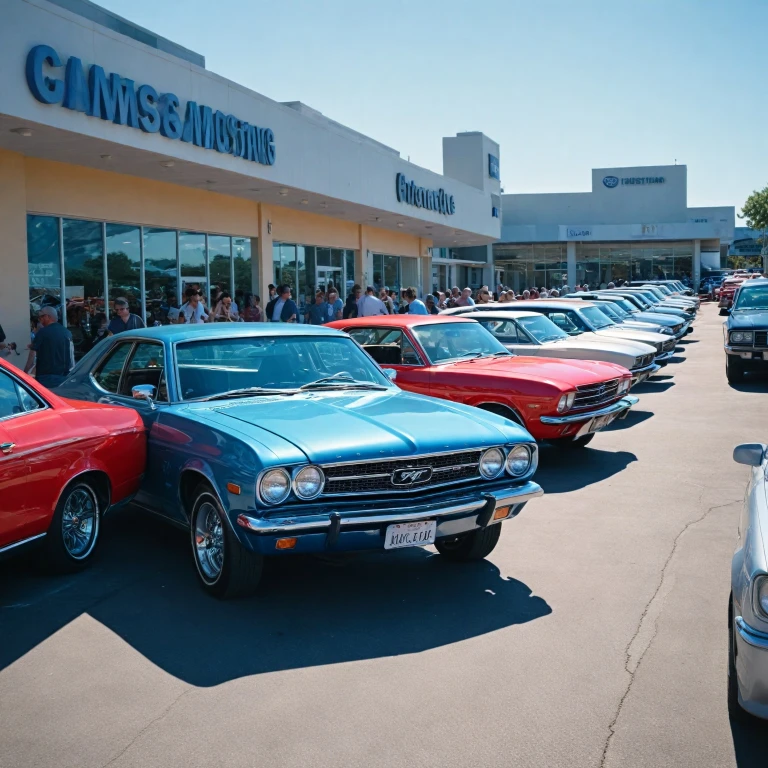
Understanding Dealer Day Dynamics
Decoding the Mechanics of Dealer Day
Dealer Day is a pivotal event in the automotive industry landscape, serving as a significant congregation for vehicle dealers and other key stakeholders. This day provides a unique opportunity for dealers to negotiate acquisition deals, explore new business strategies, and stay informed about the latest trends within the industry. Whether you're dealing with a pre-owned inventory or looking to expand your auto mall, understanding the dynamics of Dealer Day is crucial for success.
Nearly every aspect of this event is dedicated to improving the automotive sales process. From navigating vehicle title and registration issues to handling the necessary processing fees and title services, this occasion is bustling with activity. Dealers operate within a competitive arena, focusing on optimizing inventory and managing the intricacies related to motor vehicle transactions, including license plates and dealer licenses.
The dynamics of Dealer Day extend beyond direct vehicle sales. It involves strategic planning around the timing of days purchase agreements and understanding the demand for various types of vehicles, including pre-owned models and those under brands like Chrysler Dodge. With increasing importance of technology, dealers are expected to integrate innovative tools into their operations to enhance service efficiency and customer satisfaction.
Moreover, the event's framework often focuses on the broader spectrum of the automotive business, which includes addressing new automotive dealer strategies, overcoming technical challenges like tecnica accesso, and examining industry evolutions. Business owners will pay close attention to these areas to fortify their trade approaches and ensure compliance with regulatory requirements, such as managing certificate titles and navigating specific registration processes.
In summary, Dealer Day provides an invaluable platform for both small and large dealers to network, trade insights, and refine their business acumen. Following through with strategic planning and remaining adaptable to future trends will ensure that dealerships capitalize on the opportunities presented by this influential event.
Key Strategies for Success
Essential Approaches for Thriving in Dealer Day Events
Navigating the complex environment of a Dealer Day event requires strategic planning. Dealers must employ effective tactics to maximize their presence and turn interactions into successes. Below are several key strategies beneficial for achieving these outcomes:- Preparation and Planning: Begin by thoroughly understanding the market trends and analyzing historical data. Evaluate the current automotive industry landscape to forecast potential shifts that might influence vehicle sales. Insightful preparation allows businesses to align themselves with demand patterns and adjust inventory, whether the focus is on new or pre-owned vehicles.
- Optimizing Inventory Display: Investors and potential customers are visually influenced by how the inventory is displayed. Curate an appealing setup that highlights crucial details such as vehicle specifications, title information, and dealership certifications, like dealer license and vehicle title certificates. This appeal can draw in browsers and augment sales opportunities.
- Leveraging Technological Tools: With technological advancements impacting the automotive industry, integrating tools for inventory and customer management streamlines processes like registration and processing fees. Employ software solutions for easier tracking of dealer license plates and title vehicle transfers, enhancing customer service standards.
- Integrating Effective Negotiation Skills: Mastery in negotiation can significantly impact the outcome of transactions during Dealer Days. Focus on building rapport, actively listening to client needs, and crafting win-win scenarios that leave both parties satisfied. This tact increases closing rates and builds long-term business relationships.
- Maximizing Networking Opportunities: Dealer Days offer a platform to connect with peers, industry leaders, and potential partners. These events are pivotal for discussing auto mall trends, industry forecasts, and exploring collaborative opportunities. Engaging with diverse participants also helps in gaining insights into trade practices and fee structures.
Common Challenges and How to Overcome Them
Overcoming Roadblocks in Dealer Day Events
Dealer Day presents a myriad of opportunities for automotive dealers, from showcasing vehicles to strengthening business alliances. However, navigating through this automotive event successfully entails understanding and tackling various challenges head-on. Here are some common hurdles that dealers face and the strategies employed to overcome them:- Inventory Management: Handling a vast array of vehicles, including pre-owned cars, can be daunting. Dealers often struggle with maintaining an optimal inventory balance that meets the demand while avoiding excessive supply. Effective inventory management tools and techniques help streamline this process, ensuring that the right vehicles are available for potential buyers. Leveraging data analytics can enhance decision-making, enabling a more efficient approach to anticipate which models will pay off in terms of demand.
- Regulatory Compliance: Dealing with the nuances of obtaining and maintaining dealer licenses, vehicle titles, and registration can quickly become complicated. Ensuring compliance with the automotive industry’s legal aspects is critical. Dealers need to keep themselves abreast of changes in processing fees, certificate title regulations, and tag title procedures to avoid legal pitfalls. Providing adequate training to staff can demystify the intricacies of auto regulations.
- Operating Costs: Costs associated with processing fees, service delivery, and license plate issuance can eat into profit margins. Addressing these financial challenges involves implementing cost-control measures and negotiating better terms with partners and vendors. Developing strategic partnerships within the automotive dealer industry can also offer avenues for shared resources and reduced expenses.
- Technological Adaptation: Embracing technological advancements is another critical area where dealers often face challenges. The reluctance to adopt new digital tools can hinder competitive advantage at a Dealer Day event. Solutions such as online auto mall platforms and enhanced customer relationship management systems can streamline operations, improving service and engagement.
The Role of Negotiation Skills
Mastering Negotiation for a Successful Dealer Day
Being adept at negotiation is a pivotal component of achieving success during Dealer Day, a cornerstone event in the automotive industry. Whether you're dealing with new or pre-owned vehicles, the ability to negotiate effectively can significantly impact your business outcomes. Here's how mastering these skills can make all the difference:
• Understanding Buyer and Seller Dynamics: On Dealer Day, dealers come together to buy and sell vehicles. This trade requires a deep understanding of both sides' needs and the dynamics involved. Successful negotiation hinges on knowing the needs and expectations of the counterpart, which can be as diverse as securing a favorable purchase price or acquiring specific license plates quickly.
• Effective Communication: The art of negotiation is communication. Dealers should be prepared to articulate their needs clearly, and listen actively to assess what the other party requires. This ensures both parties feel heard and valued, paving the way for mutually beneficial agreements.
• Value Proposition: Buyers and sellers are more likely to reach a favorable agreement if there is a clear and compelling value proposition. Dealers that communicate the unique benefits of their inventory, such as exclusive services or reduced processing fees, often have an upper hand.
• Leveraging Industry Insights: Grasping current trends and data is crucial in negotiation. Dealers must be equipped with knowledge about market conditions, such as popular vehicle models or shifts in the automotive industry. This information can support positions during talks, ensuring competitive deals are secured.
• Patience and Persistence: Negotiation is a process that frequently demands patience. Dealers who can remain calm and continue negotiations, even when initial offers aren't accepted, often find themselves securing better day-to-day results.
Effective negotiation at automotive events relies on these strategic approaches, supported by industry knowledge and interpersonal skills. As technology advances, negating the traditional paperwork by adopting digital platforms can streamline the process, further enhancing negotiation efficiency. Leveraging both traditional tactics and modern tools will pay dividends in achieving success during Dealer Day.
Technological Advancements Impacting Dealer Day
Innovations Transforming Dealer Day
The automotive sector is experiencing a technological revolution, influencing every aspect of Dealer Day, from inventory management to customer engagement. Several technological advancements are reshaping how vehicles are traded and businesses are run, providing new opportunities and challenges for dealers.
One crucial area of impact is inventory management. Techniques such as accurate data archiviazione tecnica and advanced analytics allow dealers to optimize inventory, ensuring they have the right mix of vehicles to meet demand. With tools to manage data effectively, dealerships can better predict trends, reducing the risk of overstocking or stockouts. Utilizing technologies that facilitate auto mall operations across large-scale inventories helps to smooth the day-to-day process.
Furthermore, the use of advanced platforms is transforming the way dealers interact with consumers. Dealer concepts that leverage online sales portals allow consumers to engage with dealers beyond the confines of a showroom. This benefits the trade and service procedures, making it easier for customers to browse through pre-owned and new cars, schedule test drives, or explore finance options. The integration of digital vehicle title processes simplifies the cumbersome physical paperwork involved in vehicle registration and processing fee payments.
Another notable advancement is the rise of artificial intelligence and customer relationship management systems, enhancing the communication flow between dealers and customers. These systems are pivotal in offering personalized marketing, keeping customers informed about the latest automotive trends, the best deals available, and even managing their license plate renewals or vehicle title updates.
Finally, advancements in license processing and new dealer technology tools have streamlined operations related to dealer license provisions and titling vehicles. Tasks like issuing a certificate title or managing a days purchase are now more efficient, reducing wait times and improving license plates management. Such technology-driven improvements significantly contribute to the success of the automotive industry and the dealers within it.
The integration of these technological advancements in Dealer Day is not without its challenges, as dealers must continuously adapt to stay competitive. However, for those who embrace these innovations, the rewards in terms of efficiency, customer satisfaction, and business growth can be substantial.



